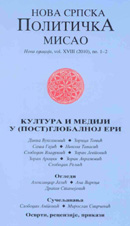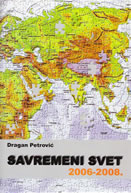| NSPM in English | |||
The E.U.'s Double Game in the Balkans |
 |
 |
 |
| utorak, 22. april 2008. | |
|
The claim that it is possible for Serbia to continue her “process of European integrations,” regardless of the status of Kosovo or of the leading EU member-states' position on this issue—is the pillar of the election campaign by the Democratic Party (Demokratska stranka, DS) of President Boris Tadic and his “pro-Western” allies. They claim that it is possible for Belgrade to conduct a dual-track policy, whereby the refusal of Serbia to accept Kosovo's independence would not influence—and therefore would not hinder—the process of getting closer to EU. That this claim is false is evident from the fact that all key EU countries except Spain have recognized Kosovo's unilateral declaration of independence. With the EU heavyweights, Britain, France, Germany, and Italy, opening their embassies and trade missions in “the Republic of Kosovo,” it is unthinkable that they would accept Serbia as a fully-fledged member of the Union unless Belgrade first “normalizes relations with all its neighbors”—Eurospeak for accepting the finality of Kosovo's independence and opening an embassy in Pristina. More importantly in the short term, the European Union—acting under an entirely self-created mandate—is attempting to insert its own “Rule of Law mission,” Eulex, into the province to replace the one authorized by United Nations Security Council in 1999. The EU mission composed of two thousand police, customs officers and judicial personnel is based on the provisions of the failed Ahtissari Plan, which was rejected by Serbia and never formally considered, let alone authorized, by the UNSC. The situation is legally and politically unprecedented. Imagine the United States deploying peacekeepers in the West Bank and Gaza in accordance with Bill Clinton's proposed Camp David agreement . . . after that agreement was rejected by one of the parties. If the European Union had wanted to help its friends in Serbia who nevertheless keep swearing by their country's “European perspective,” it would have refrained—until May 11, at least—from doing or saying anything contrary to their wishful thinking and surreal rhetoric. This would be cynical, of course, but not unprecedented: the final decision on Eulex was initially supposed to be taken on January 28, but the EU decided to postpone it in order not to undermine Boris Tadic's chances of reelection in the second of Serbia's presidential election on February 3. Literally hours after the election was over, a Council Joint Action was approved , paving the way for the deployment process. Far from helping Tadic and his Europhile coalition in the current campaign, the Brussels machine is driving them to exasperation with statements and acts that appear almost calculated to help their those political forces that have been warning of the EU double game in the Balkans:
All of the above indicates that Brussels is following a sustained, deliberate, and more or less open policy of actively supporting Kosovo's independent statehood, even in the absence of any formal EU document declaring this to be the case. That is exactly what Prime Minister Kostunica and his allies have been saying for months, and this is what finally caused the collapse of the coalition government in early March. There is still no real debate in Serbia on the EU, however; and what discussion there is remains highly ideological. No matter what Messrs Feith, Solana, Rehn and others do or say, Tadic and the DS will refuse to discuss the problem. Any attempt at critical examination of the policies pursued from Brussels elicits a quick “anti-European” label from their camp, just as any attempt at critical examination of the policies pursued by the communist regime two or three decades ago invited the accusation of “anti-socialist enemy propaganda.” Ironically but unsurprisingly, today's most enthusiastic pro-EU neoliberals are often the same people as yesterday's zealous Titoists, or else their spiritual or biological heirs. By now the mantra that “European integrations have no alternative” is wearing thin, however. It is beginning to irritate many urbane and by no means nationalist Serbs who had previously supported the “European course” for the country, but who look upon Sr. Solana's professions of affection and thinly veiled political inducements, as insulting and shameful. According to the latest opinion poll by the Belgrade-based Centre for Free Elections and Democracy, CESID, the Radicals, together with the “popular block” of Prime Minister Kostunica and his junior coalition partner, Nova Srbija, may get enough votes on May 11 for a simple combined majority in the next parliament. On current form that is exactly what Brussels and Washington want. They hope to see their “pro-European” friends defeated and their “nationalist” opponents enthroned, in order to justify, however retroactively, their illegal and self-defeating Kosovo policies. If the Radicals enter government in Belgrade in late spring or early summer 2008, it will be the explanation for encourganing Albanians not to negotiate with Belgrade in 2007, the reason for prodding them to declare independence on February 17, 2008, and the justification for recognizing their separatist entity after that date. The precedent exists, of course. It is the manner in which Sr. Solana's splendid little NATO war against Serbia in '99 came to be retroactively justified by the “humanitarian disaster” in Kosovo that started after the bombing, and was caused by the bombing . The problem Borist Tadic and his “pro-Western” allies face today in relation to the European Union is identical to the one faced by Serbia's tiny collaborationist movement during World War II occupation (1941-1944) vis-a-vis the “New European Order.”
The good news is that the final loutcome is no more cast in stone today than it was in 1941. Yes, the “ Republic of Kosova ” will linger on for a few years, as an extravagant experiment costing West European taxpayers a few billion a year. Yes, it will continue developing—not as a functional economy, of course, but as a black hole of criminality and terrorism. In the end the experiment will prove as enduring as that earlier Greater Albania, 67 years ago. |
Ostali članci u rubrici
- Playing With Fire in Ukraine
- Kosovo as a res extra commercium and the alchemy of colonization
- The Balkans XX years after NATO aggression: the case of the Republic of Srpska – past, present and future
- Iz arhive - Remarks Before the Foreign Affairs Committee of the European Parliament
- Dysfunction in the Balkans - Can the Post-Yugoslav Settlement Survive?
- Serbia’s latest would-be savior is a modernizer, a strongman - or both
- Why the Ukraine Crisis Is the West’s Fault
- The Ghosts of World War I Circle over Ukraine
- Nato's action plan in Ukraine is right out of Dr Strangelove
- Why Yanukovych Said No to Europe

.jpg)








 In theory the European Union is horrified at the prospect of the Radical Party of Serbia (Srpska radikalna stranka, SRS) becoming not only the strongest party in the country's parliament—which it already is—but also the majority partner in a new ruling coalition after the general election on May 11. In practice, the EU officials in Brussels and in Kosovo are acting as if this is the outcome they earnestly desire.
In theory the European Union is horrified at the prospect of the Radical Party of Serbia (Srpska radikalna stranka, SRS) becoming not only the strongest party in the country's parliament—which it already is—but also the majority partner in a new ruling coalition after the general election on May 11. In practice, the EU officials in Brussels and in Kosovo are acting as if this is the outcome they earnestly desire. 












